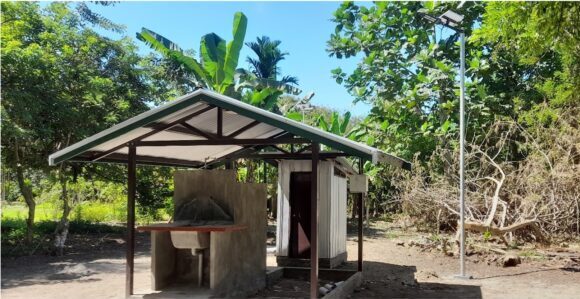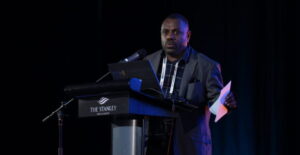The winner of this year’s Innovation PNG Award for Small Business is an ingenious all-in-one water, sanitation and washing station designed for use by Papua New Guinea’s village communities. We take a closer look at Environmental Health Development Agency’s Water SHE Technology.

Water SHE Technology is an all-in-one water, sanitation and washing station designed for use by village communities. Credit: Environmental Health Development Agency
The Environmental Health Development Agency (EHDA), winner of this year’s Innovation PNG Award for Small Business, aims to “minimise drudgery on women, young girls and children having to do multiple tasks at a single water point,” according to its Director, Boas Sengi.
“The judges share the view of the inventor, Boas Sengi, that it has the potential to be rolled out to villages across the country.”
Lae-based EHDA won the award for its Water SHE Technology, an all-in-one water, sanitation and washing station designed for use by village communities.
Sengi noted in his acceptance speech at Innovation PNG 2025 that these facilities have already made a major impact where they are installed. For example, he said that 12,544 people, including children and people living with disabilities, benefitted from the technology as the result of a contract with Australia’s Department of Foreign Affairs and Trade which ran between 2019 and 2022.
Meeting all water needs

Environmental Health Development Agency’s Boas Sengi. Credit: BAI
The Water SHE Technology (which stands for ‘Water, Sanitation, and Hygiene Empowered Technology’) provides a single source for a village’s water needs, including for drinking water, kitchen taps, laundry work, bathing, and toilets.
It involves the building of a WaSH (water, sanitation and hygiene) facility in central points in villages to reduce workload for village women who previously have had to travel long distances to acquire clean water.
The WaSH facility has a roof to keep users out of the harsh sunlight and contains solar-powered lights so that women can freely use the facilities at any time, including at night.
The facility also allows for water storage and purification, improving health outcomes.
Beyond hygiene and hydration, Sengi framed the WaSH facility as a meeting place, “[giving] freedom and [empowering] women to speak up about their own issues when they meet at a female WaSH station for bath, laundry, showers and toilets”.
Case studies of the program have already yielded positive results, with Sengi noting the tangible impact on community members.
“Mothers, especially grandmothers, [have] showed the hairless part of the head caused by the daily burden of carrying containers of water in string bags, which they are now freed of.”
Scalable and replicable
These facilities have benefits beyond their use cases, as part of the initiative involves training local users to become skilled water technicians, allowing skill-building in remote communities.
In making the award to EHDA, the Innovation PNG judging panel, chaired by futurist and inventor Mark Pesce, highlighted the potential of the project:
“The judges were impressed by the unit’s design and its successful trials, which have already delivered the safe and hygienic facility to thousands of villagers. The judges share the view of the inventor, Boas Sengi, that it has the potential to be rolled out to villages across the country.”
Special commendations
The judges also made three special commendations for this year’s Innovation PNG Award for Small Business: Port Moresby’s Bobatom Tech and Consultancy for its e-learning platform, Mt Hagen’s Gotronical Engineering for its design of a sago extraction machine, and Lae’s Project Support Services for its range of solar-powered mills for smallholder farmers.









Speak Your Mind